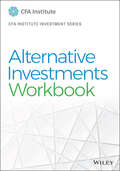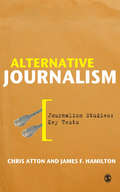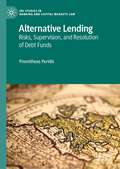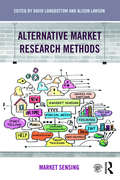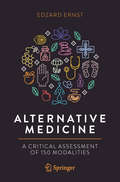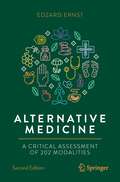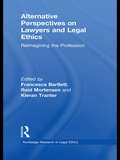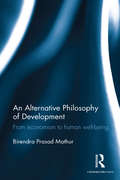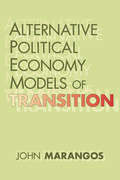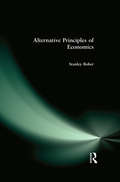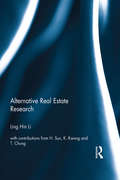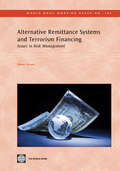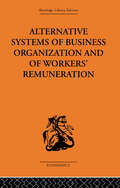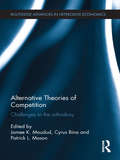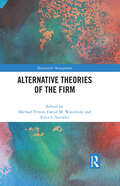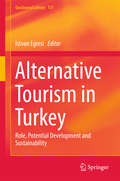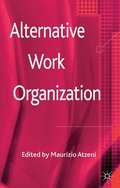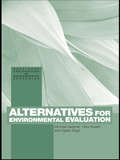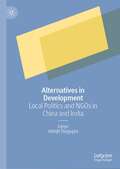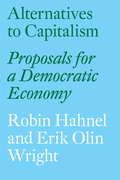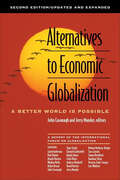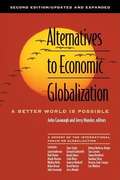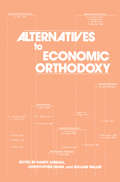- Table View
- List View
Alternative Investments Workbook (CFA Institute Investment Series)
by CFA InstituteHands-on practice with alternative investments based on real-world scenarios Alternative Investments Workbook provides the key component of effective learning—practice. Designed for both students and investment professionals, this companion workbook conveniently aligns with the Alternative Investments text chapter-by-chapter, offers brief chapter summaries to refresh your memory on key points before you begin working, and explicitly lays out the learning objectives so you understand the “why” of each problem. This workbook helps you: Synthesize essential material from the Alternative Investments text using real-world applications Understand the key characteristics of non-traditional investments Work toward specific chapter objectives to internalize important information CFA Institute is the world's premier association for investment professionals, and the governing body for the CFA® Program, CIPM® Program, CFA Institute ESG Investing Certificate, and Investment Foundations® Program. Those seeking a deeper understanding of the markets, mechanisms, and use of alternatives will value the level of expertise CFA Institute brings to the discussion as well as the extra practice delivered in Alternative Investments Workbook based on real scenarios investors face every day.
Alternative Journalism (Journalism Studies: Key Texts)
by James F. Hamilton Chris AttonAlternative Journalism is the first book to investigate and analyse the diverse forms and genres of journalism that have arisen as challenges to mainstream news coverage. From the radical content of emancipatory media to the dizzying range of citizen journalist blogs and fanzine subcultures, this book charts the historical and cultural practices of this diverse and globalized phenomenon. This exploration goes to the heart of journalism itself, prompting a critical inquiry into the epistemology of news, the professional norms of objectivity, the elite basis of journalism and the hierarchical commerce of news production. In investigating the challenges to media power presented by alternative journalism, this book addresses not just the issues of politics and empowerment but also the journalism of popular culture and the everyday. The result is essential reading for students of journalism - both mainstream and alternative. Praise for the Journalism Studies: Key Texts series: 'It is easy to describe a good textbook for a specific journalistic format... The ideal book has to satisfy a list of requirements that are also bullet-pointed in journalism assignment outlines. A text has to: synthesize the existing body of knowledge; explain concepts clearly; have a logical order of topics; and provide enough information and directions to pursue further study. One may also hope it would include real life examples and be lucid, vivid and a pleasure to read. Hard to find? Not anymore. The new SAGE series Journalism Studies: Key Texts satisfies the main requirements on the list. Carefully planned and meticulously edited by Martin Conboy, David Finkelstein and Bob Franklin, the textbook series is a welcome contribution to the literature of journalism studies... All three books follow the same structural template: an overview of historical development; explication of the political and economic frameworks within particular types of journalism; a review of contemporary practices; social demographics; a comparative analysis of practices around the world; a summary of main conceptual approaches; an indication of future directions; recommendations for further reading. This strong organization resembles a template for a course outline. This is intentional because the series is aimed both at students and their practice-based lecturers, who often come straight from industry and need time to adjust to the academic environment... [The series] achieves its aim to bridge the sometimes too evident dissonance between journalism theory and practice... They successfully situate discussions about journalism in social and historical contexts. We see the faces of individual journalists, the circumstances of news production, the relationship with owners, the battle between the public service and the profit nature of news, the relevance of journalism work. The detailed account of the conditions under which newspaper, radio and alternative journalism is produced and performed make the Journalism Studies: Key Texts series mandatory reading for both journalism students and their lecturers' - Verica Rupar, Journalism Studies
Alternative Lending: Risks, Supervision, and Resolution of Debt Funds (EBI Studies in Banking and Capital Markets Law)
by Promitheas PeridisThe book covers alternative lending using the emergence of Debt Funds in the EU as a case study. The book explores the risks that they can pose to financial stability, and the regulatory and supervisory tools available to mitigate these risks. Through this analysis, the book uncovers the risks and potential risk mitigation tools that can be applied to the alternative lenders–including debt funds and other potential alternative lenders. After identifying the reasons behind the growth of alternative lenders (using as example the assets of Alternative Investment Funds (AIFs) and in particular debt funds) and the simultaneous decrease of the banks’ assets, the book analyses the systemic importance of the alternative lenders and the risk channels through which the systemic risk can spread to the banking sector and the financial system. Then, the book deals with the financial innovation-market failure theory and demonstrates that financial innovations (e.g. debt funds, securitisations) can cause market failures, resulting in regulatory interventions. Of interest to banking and financial regulation academics, researchers, and practitioners this book analyses the regulatory provisions in place for both credit institutions and debt funds, including the Basel Accords, the Capital Requirements Directives and Regulations, and the Alternative Investment Fund Managers Directive (AIFMD) and its implementation in various EU jurisdictions, before offering a proposal for a new three-defensive framework applicable to debt funds and to other potential alternative lenders.
Alternative Market Research Methods: Market Sensing
by David Longbottom Alison LawsonTraditional research methods in marketing can be illuminating when used well, but all too often their data-driven results fail to provide the depth of understanding that organisations need to anticipate market needs. Alternative Market Research Methods: Market sensing is a new approach that enables researchers to get greater depth and meaning from their research and organisations to make smarter strategic decisions. This book, the first text dedicated to the topic, explains market sensing simply and practically and demonstrates how it can benefit researchers. It teaches non-mainstream and alternative research methods which facilitate innovative research design, and achieves deep insights into the mindsets of consumers. The methods explored in this book include: emotional scaling ; discourse analysis; consumer ethnography; social media networks; narrative and story telling; gamification. With a wealth of case studies and pedagogy to aid student learning, as well as online teaching aids including PowerPoint presentations and video content, this ground-breaking textbook is an essential resource for anyone that wants to expand their repertoire of marketing research methods to create a research project that will be original and insightful.
Alternative Medicine: A Critical Assessment of 150 Modalities
by Edzard ErnstAlternative medicine (AM) is hugely popular; about 40% of the US general population have used at least one type of alternative treatment in the past year, and in Germany this figure is around 70%. The money spent on AM is considerable: the global market is expected to reach nearly US $ 200 billion by 2025, with most of these funds coming directly out of consumers’ pockets. The reasons for this popularity are complex, but misinformation is certainly a prominent factor. The media seem to have an insatiable appetite for the subject and often report uncritically on it. Misinformation about AM on the Internet (currently about 50 million websites are focused on AM) is much more the rule than the exception. Consumers are thus being bombarded with misinformation on AM, and they are ill-protected from such misinformation and therefore prone to making wrong, unwise or dangerous therapeutic decisions, endangering their health and wasting their money. This book is a reference text aimed at guiding consumers through the maze of AM. The concept of the book is straightforward. It has two main parts. The first, short section provides essential background on AM, explaining in simple terms what is (and what is not) good, reliable evidence, and addressing other relevant issues like, for instance, the placebo response, informed consent, integrative medicine, etc. The second and main part consists of 150 short chapters, topically grouped and each dedicated to one single alternative therapeutic or diagnostic method. In each of them, seven critical points are raised. These points relate to issues that are important for consumers’ decisions whether it is worth trying the method in question. Restricting the discussion to just seven points means that issues must be prioritized to those themes which are most relevant in the context of each given modality.
Alternative Medicine: A Critical Assessment of 202 Modalities (Copernicus Books)
by Edzard ErnstAlternative medicine (AM) is popular; about 40% of the US general population have used alternative treatment in the past year, and in Germany this figure is around 70%. The global market is expected to reach nearly US $ 200 billion by 2025, with most of these funds coming directly out of consumers’ pockets. Consumers are bombarded with misleading and false information on AM and therefore prone to making wrong, unwise, or dangerous therapeutic decisions, endangering their health and wasting their money. This book is a reference text aimed at guiding consumers through the maze of AM. This second edition includes over 50 additional treatments as well as updates on many others.
Alternative Perspectives on Lawyers and Legal Ethics: Reimagining the Profession (Routledge Research in Legal Ethics)
by Francesca BartlettThe study of legal ethics and the legal profession has emerged as a distinct and important field of scholarship over the last 30 years. However, as in other disciplines, academic recognition can in turn entrench static and powerful meta-theories and narratives about professional ethos and practise, this collection seeks to disrupt this homogenising impulse and to present alternative voices by bringing together a range of international scholars writing about legal ethics and the legal profession. The book features significant and timely contributions which take contemporary and non-mainstream perspectives on the current and future shape of the legal profession. The essays not only describe the rapidly changing profession but canvas different approaches to scholarship on the legal profession. The collection seeks to explore a diverse and contextualised profession from a number of angles. Authors examine how the public sees lawyers and how lawyers see their own profession; how we practise law and how this practice shapes lawyers; how such cultural and professional practice intersects with institutional structures of the law to create certain legal outcomes; and how we regulate the legal profession to modify or institute ethical practice. The volume provides insights into legal culture and ethics from the perspective of authors from Australia, Canada, England, the United States, New Zealand and Kenya – a diversity of national perspectives that give valuable insights into developments in the profession at the local and global level. It also illustrates diversity within the profession by tracing differing professional career trajectories based on raced or gendered barriers, alternative ethical strategies and the impact of organisational cultures in which lawyers practice.
An Alternative Philosophy of Development: From economism to human well-being
by Birendra Prasad MathurWhile development has been the foremost agenda before successive governments in India, it has been viewed narrowly – from the perspective of economic development and particularly in terms of gross domestic product (GDP). This book questions such an approach. It breaks from the conventional wisdom of GDP growth as being a definitive measure of the success of a country’s policies and offers an alternative development philosophy. The author contends that people’s economic and social welfare, life satisfaction, self-fulfilment and happiness should be treated as indicators of real development. The book underlines that in a successful model of development, the country’s economic policies will have to synergize with its cultural ethos and that the objective of development should be gross national happiness and well-being of the people. This book will be useful to scholars and researchers of development studies, economics, public policy and administration, governance, political science and sociology, as well as to policymakers.
Alternative Political Economy Models of Transition: The Russian and East European Perspective
by John MarangosThe collapse of centrally administered socialism in Russia and Eastern Europe resulted in what is commonly referred to as the transition problem: the transformation from a centrally administered socialist economic system to one that is market-based. Economic science has been faced with the challenge of developing an appropriate body of analysis, advice, and direction to help other nations that may be undergoing this process. In this volume, John Marangos adopts a political economy approach that yields alternative models of transition.The volume develops transition models from what Marangos defines as the primary elements of six variables: (1) economic analysis; (2) definitions of the Good Society; (3) speed of transition; (4) political structure; (5) ideological structure; and (6) initial conditions. The models developed include: the shock therapy model, the neoclassical gradualist model of transition, the post Keynesian model, the pluralistic market, the socialist model, and the non-pluralistic market socialist model. After identifying the primary elements of each transition model, Marangos considers the elements of each model with respect to the desirable reforms.An essential element of the transition process is not only to identify the necessary reforms but also a sequence in which the reforms should be introduced. For each transition model developed in this book, a set of primary and secondary elements were provided in conjunction with a sequence of reforms. Analyzing the transition problem from a political economy perspective, Marangos shows that it is possible to have inconsistencies within each transition model and between transition models yet be able to identify the potential for implementation and maintenance of necessary reforms each model recommends. This volume contributes to the understanding of the process of transition, with the objective of identifying an optimal model of transition.
Alternative Principles of Economics
by Stanley BoberThis is the first book to provide a complete introduction to Post-Keynesian and other alternative theories of economics. Concise yet comprehensive, and written to be accessible to a wide audience, it offers a unique opportunity to enhance traditional neo-classical economics training with authoritative coverage of the full range of the non-orthodox paradigm.
Alternative Real Estate Research
by Ling Hin LiThis book aims to provide insight into the "soft" side of real estate research and the interesting results and implications of the real estate research outside the traditional realm of investment/financial aspects. The book also attempts to answer what constitutes the so-called "soft-side" of real estate research if we shift our focus from the usual financial returns and investment analysis. It also attempts to address whether there is such thing as an alternative real estate research paradigm. The book also argues that research in real estate should not only be limited to land and property market performance analyses as this may greatly impair the potential research implications of various real estate studies. The book argues that such analyses take on a very myopic view of real estate research. This book will interest many who wish to learn more about the alternative aspect of real estate research which is more than just about investment analysis.
Alternative Remittance Systems and Terrorism Financing: Issues in Risk Mitigation
by Matteo VaccaniGovernments, through their regulatory bodies, typically regulate formal financial sector players such as banks, which can leave providers working in informal remittance systems outside regulatory channels. Value transfer services-financial transfers performed domestically or across borders on behalf of clients-are essential to the financial system, and as such, are often offered by both formal and informal actors. Law enforcement and counter-terrorism authorities are evaluating money and value transmission channels for vulnerabilities that may make these channels attractive for illicit use, including the financing of terrorism. 'Alternative Remittance Systems and Terrorism Financing: Issues in Risk Management' aims to help countries bring these informal alternative remittance systems into their counter-terrorism programs, without hindering the ability of those who depend on these systems to send and receive money at low cost.
Alternative Systems of Business Organization and of Workers' Renumeration
by J.E. MeadeExamining the relationship between employment and rates of pay, this book discusses how the choice between different forms of business organization may affect this relationship. For the purposes of the discussion a simple model of an imperfectly competitive economy is constructed and then examined in operation with different organizational forms for the competing firms. Chapters cover the following:The Captialist Wage Economy; The Non-Discriminating Labour Co-operative; The Capitalist Sharing Economy; Discriminating Labour-Capital Partnerships.
Alternative Theories of Competition: Challenges to the Orthodoxy (Routledge Advances In Heterodox Economics Ser. #14)
by Jamee K. Moudud Cyrus Bina Patrick L. MasonThe history of policymaking has been dominated by two rival assumptions about markets. Those who have advocated Keynesian-type policies have generally based their arguments on the claim that markets are imperfectly competitive. On the other hand laissez faire advocates have argued the opposite by claiming that in fact free market policies will eliminate "market imperfections" and reinvigorate perfect competition. The goal of this book is to enter into this important debate by raising critical questions about the nature of market competition. Drawing on the insights of the classical political economists, Schumpeter, Hayek, the Oxford Economists’ Research Group (OERG) and others, the authors in this book challenge this perfect versus imperfect competition dichotomy in both theoretical and empirical terms. There are important differences between the theoretical perspectives of several authors in the broad alternative theoretical tradition defined by this book; nevertheless, a unifying theme throughout this volume is that competition is conceptualized as a dynamic disequilibrium process rather than the static equilibrium state of conventional theory. For almost all the others the growth of firm is consistent with a heightened degree of competitiveness, as both Marx and Schumpeter emphasized, and not a lowered one as in the conventional 'monopoly capital' view.
Alternative Theories of the Firm (Humanistic Management)
by Michael PirsonThe Theory of the Firm is commonly viewed as axiomatic by business school academicians. Considerations spanning organizational structures, their boundaries and roles, as well as business strategies all relate to the theory of the firm. The dominant theory of the firm poses that markets act perfectly to maximize the well-being of society when people act to maximize the personal utility of their individual purchases and firms act to maximize financial returns to their owners. However, burgeoning evidence and discourse across the scientific and policy communities suggests that the economic, social, and environmental consequences of accepting and applying this theory in the organization of business and society threatens the survival of the human species, among countless others. This book provides the latest thinking on alternatives to the theory of the firm as cornerstone of managerial decision making. Authors explore and elucidate theories that help us understand a firm differently and suggest alternatives to the theory of the firm. This book will be of value to researchers, academics, practitioners, and students interested in leadership, strategic management, and the intersection of corporate interests and the wellbeing of society.
Alternative Tourism in Turkey: Role, Potential Development and Sustainability (GeoJournal Library #121)
by Istvan EgresiThis book takes inventory of and evaluates the available resources for the development of alternative tourism in Turkey. It examines the role of alternative tourism in future tourism development plans and proposes public policies necessary to assure sustainability. Although tourism started later in Turkey than in the Western Mediterranean countries it has grown very rapidly during the last three decades and today the country ranks among the top ten countries in the world in terms of both arrivals and receipts. However, most of the tourism development has been in the mass tourism sector or the so-called sun-sea-sand tourism. While crucial for the economic development of Turkey, mass tourism, in the absence of proper planning, has happened in a haphazard manner leading to numerous environmental and socio-cultural problems. This book argues that, in order to mitigate these problems, Turkey should encourage the development of alternative forms of tourism.
Alternative Work Organizations
by Maurizio AtzeniCurrent and historical examples in the labour movement worldwide have helped to debunk the myth that workers cannot run production. Workers can take control of factories, reverting many assumptions about property, management, work organisation, wages andchallenge the almost natural character of capitalist work relations. This volume uses geographically and historically diverse examples to analyse the challenges and questions that alternative forms of work present to those involved.
Alternatives: How to Make Smarter Choices by Creating Better Alternatives to Choose From
by John S. Hammond Ralph L. Keeney Howard RaiffaAlternatives are the raw material of decision making. This chapter looks at an important element of effective decision making: creating imaginative alternatives or different courses of action you have to choose from.
Alternatives: The Source of Superior Solutions
by Richard LueckeTo make an informed decision, you must be able to look at alternative solutions and weigh the merits of those alternatives. This chapter explains how to generate other possibilities, brainstorm effectively, and combine features to create a hybrid alternative.
Alternatives for Environmental Valuation (Routledge Explorations in Environmental Economics #Vol. 4)
by Michael Getzner Clive Spash Sigrid StaglMethods for raising awareness of how human’s value the environment range from monetary valuation through to greater public participation in decisions. In this book a group of international experts explore innovative alternatives which are critically evaluated and compared. Lessons are drawn from both the successes and failures of different approaches. Case studies address a wide variety of cutting edge environmental problems from agro-forestry and wetlands to climate change, biodiversity and genetically modified organisms.
Alternatives in Development: Local Politics and NGOs in China and India
by Liyiyu Abhijit DasguptaThis book deals with the dynamics of local-level politics in China and India. China introduced new policies to restructure local politics in 1978. In place of communes, civil society organizations and cooperatives were introduced in villages. More changes came about with the introduction of the Organic Law of the Villagers' Committees of the People's Republic of China in 1998. The new local power structure includes state-sponsored institutions like Villagers Committees and the traditional civil society organizations (CSOs) and non-government organizations (NGOs). As in China, local politics in India undergoes considerable changes during the last few decades. Panchayati Raj Institutions (PRIs) were reformed in 1992 with a constitutional amendment act. CSOs and NGOs were allowed to function. Against this background, the present book is undertaken with the objectives first, to present two different models of local politics and second, to compare the two, finally to focus on the two different models of development. This book will interest scholars of rural governance, rural transformation, and the role of the grassroots CSOs and NGOs in shaping development program and growth in the two large countries in Asia.
Alternatives to Capitalism: Proposals for a Democratic Economy
by Robin Hahnel Erik Olin WrightWhat would a viable free and democratic society look like? Poverty, exploitation, instability, hierarchy, subordination, environmental exhaustion, radical inequalities of wealth and power--it is not difficult to list capitalism's myriad injustices. But is there a preferable and workable alternative? Alternatives to Capitalism: Proposals for a Democratic Economy presents a debate between two such possibilities: Robin Hahnel's "participatory economics" and Erik Olin Wright's "real utopian" socialism. It is a detailed and rewarding discussion that illuminates a range of issues and dilemmas of crucial importance to any serious effort to build a better world.From the Trade Paperback edition.
Alternatives to Economic Globalization: A Better World Is Possible
by John Cavanagh Jerry MandersWritten by a premier group of 21 thinkers from around the world, the second edition of Alternatives to Economic Globalization lays out democratic, ecologically sound, socially just alternatives to corporate globalization more fully, specifically, and thoughtfully than has ever been done before. Focusing on constructive, achievable goals, the authors present ten governing principles for establishing truly sustainable societies and describe alternatives to the World Bank, the IMF, and the WTO that would better serve the needs of the planet. They offer detailed proposals for protecting vital goods and services from corporate exploitation, limiting corporate privileges and power, rebuilding economies to make them more responsive to human needs, and more. This revised and expanded edition features a new opening chapter on the global balance of power, a new section on the media and globalization, and a new final chapter on what ordinary citizens can do to fight the injustices of globalization. It also includes many new charts, sidebars, and other updated information.
Alternatives To Economic Globalization
by The Editors of the International Forum on Globalizationargues that the current model of economy is both unjust and unsustainable and presents alternatives
Alternatives to Economic Orthodoxy: Reader in Political Economy
by Randy AlbeldaExploring the question of whether China's peasantry was a revolutionary force, this volume pays particular attention to the first half of the 20th century, when peasant-based conflict was central to nationwide revolutionary processes. It traces key themes of social conflict and peasant resistance.
